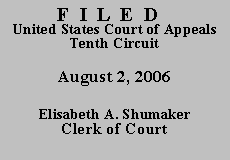

UNITED STATES OF AMERICA,
Plaintiff-Appellee,
v.
ISIDRO PALOMINO-GARCIA a/k/a
Marcos Mendez-Garcia,
Defendant-Appellant.
Before KELLY, McKAY, and
LUCERO, Circuit Judges.
Appellant pleaded guilty to one count of unlawful reentry by an alien who had been deported subsequent to convictions for aggravated felonies, in violation of 8 U.S.C. § 1326(a) and (b)(2). A presentence investigation report found that, according to the applicable sentencing guidelines, Appellant's guideline sentencing range was 77-96 months' imprisonment. The district court sentenced Appellant to 84 months' imprisonment plus three years supervised release. Appellant appeals this judgment and order, arguing that he merited a below-range sentence.
Appellant is a career criminal who has been deported to Mexico several times and has been arrested for numerous felonies in the United States. In imposing sentence, the district court stated that the United States Sentencing Guidelines were advisory, and proceeded to discuss each of the sentencing factors in 18 U.S.C. § 3553(a) with reference to the facts of the case. The district court emphasized that Appellant had "an extensive criminal history, including crimes of reckless disregard and crimes of violence," and that his criminal history demonstrated a particular need to promote respect for the law, provide adequate deterrence, and protect the public.
A sentence which is within the advisory Guidelines range is entitled to a presumption of reasonableness on appeal. United States v. Kristl, 437 F.3d 1050, 1053 (10th Cir. 2006). We further stated that "[t]his is a deferential standard that either the defendant or government may rebut by demonstrating that the sentence is unreasonable when viewed against the other factors delineated in § 3553(a)." Id. at 1054. The record establishes beyond question that the district court considered all of the § 3553(a) factors, and did so with specific reference to the facts of the case and the arguments of Appellant's counsel.
On appeal, Appellant only takes issue with the district court's refusal to impose a lower sentence because of (1) the "relative lack of seriousness" of his previous convictions and (2) the alleged circumstances giving rise to his conviction for escape, which he contends show no "escape" within the meaning of the statute of conviction. As to his first claimseriousness of previous convictionsAppellant has convictions for assault, automobile burglary, vehicular eluding, aggravated driving while intoxicated, resisting arrest, illegal reentry after deportation, and possession of drug paraphernalia. Second, Appellant argues that his escape should not have been counted as a crime of violence because he did not actually commit the offense, at least as charged. This amounts to an improper collateral attack on the prior conviction, which we cannot consider. United States v. Delacruz-Soto, 414 F.3d 1158, 1165-67 (10th Cir. 2005).
We have carefully reviewed the briefs of Appellant and Appellee, the district court's disposition, and the record on appeal. For substantially the same reasons as the district court enumerated at sentencing, we AFFIRM Appellant's sentence.
Entered for the Court
Monroe G. McKay
Circuit Judge
*. This order and judgment is not binding precedent, except under the doctrines of law of the case, res judicata, and collateral estoppel. The court generally disfavors the citation of orders and judgments; nevertheless, an order and judgment may be cited under the terms and conditions of 10th Cir. R. 36.3.